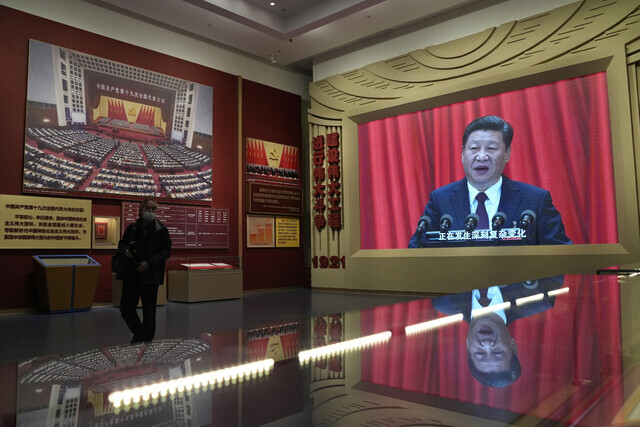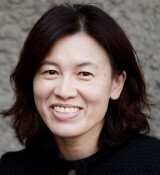hankyoreh
Links to other country sites 다른 나라 사이트 링크
[Column] After rewriting history, Xi Jinping faces an uncertain future


The third historical resolution issued in the 100-year history of the Chinese Communist Party (CCP) isn’t about history. By rewriting history, Chinese President Xi Jinping has consolidated his power over the future.
This historical resolution represents a robust declaration that China will go its own way — down a path that differs from the democracy, human rights and capitalism of the US model. Economically speaking, this is the path of state-led capitalism, which has been dubbed “socialism with Chinese characteristics”; economically, socially and ideologically speaking, this is the path of authoritarianism under the iron grip of the CCP.
When Xi speaks of “once-in-a-century changes,” he is describing a sea change in which China overtakes the US as the world’s greatest power. Xi and his allies underscore that if China is to achieve its grand goal of becoming a superpower through “common prosperity,” technological autonomy, and military modernization, and if it’s to navigate the challenges that will arise both domestically and internationally along the way, a strong leader along the lines of Xi must stay at the helm for an extended period. By declaring that “Xi Jinping Thought” is “Marxism of contemporary China and of the 21st century” that “embodies the best of the Chinese culture and ethos in our times,” Xi is stating that he will brook no criticism or challenges.
While it might appear that this historical resolution has further consolidated Xi’s power, it also places a heavier burden upon the man who is now responsible for all the decision-making. The greatest challenge for Xi is China’s hegemonic rivalry with the US and the growing signs of economic recession. Cutting-edge technology is the key area in the US-China competition, and the high-tech net that the advanced economies have drawn around China is in fact beginning to tighten.
When the Trump administration called for decoupling with China in 2018, many people regarded that as an unrealistic slogan. Removing China from the intricate global supply chain produced by globalization was impossible, they thought, and American allies would never join such an effort given the losses they would incur. But the situation changed this year, following Biden’s inauguration, when the European Union joined forces with the US to take action against the market and competition distortions caused by China’s state-directed economy.
Because all-out decoupling with China is impossible, the US and the EU are focusing their efforts on specific sectors. According to an analysis by Kim Yang-hee, head of economic, trade and development research at the Korean National Diplomatic Academy, the US and its allies are building a “trusted value chain” that excludes China from the supply chain for key cutting-edge technology that is dual-use, meaning it can be used in both industry and the military. At the same time, these countries are maintaining the global supply chain and regional supply chains through which they can trade with China in non-sensitive goods and are using domestic value chains for critical goods that are ultra-sensitive for national security. Thus, various supply chains are operating in parallel.
The US has brought South Korea, Japan and Taiwan into a trusted value chain from which China is excluded and is also widening its net with the Quad (the US, India, Japan and Australia), the Group of Seven (G7), the EU-US Trade and Technology Council and the G14. These countries are taking part because it’s in their interest to delay China’s technological pursuit and to take the lead in next-generation cutting-edge technology. If this alignment hardens, it will gradually become increasingly expensive for China to access the markets, equipment and cutting-edge technology required to upgrade its economy and compete with the US.
What should Korea do? “The US has the lead in semiconductors, artificial intelligence and quantum computing, and South Korea has no choice but to participate in the US-led ‘trusted value chain’ for the industries of the future. As for our specific role in that value chain, that’s something the government and corporations need to be vigorously debating and preparing for,” Kim said.
In China’s domestic economy, a recession is growing more palpable because of the limitations of a growth model that’s overdependent on real estate, heavy-handed regulation of the private sector, and excessive COVID-19 restrictions. It remains unclear whether Xi’s “common prosperity” initiative will be successful at mitigating inequality and converting to a growth model that’s focused on domestic demand. The strongest resistance to the reforms aimed at achieving common prosperity, including property and inheritance taxes, comes from the senior cadres of the CCP, who represent the Chinese establishment.
“China has become a 20-80 society, in which 20% represent an upper class that mostly consists of the 95 million party members and their families and 80% are non-party members who don’t have access to wealth. That’s the hardest part of reform,” observed Jee Man-soo, senior research fellow in international finance at the Korea Institute of Finance. While Xi continues to urge party members to keep the party’s original purpose in mind, reducing their vested interests comes with great political risks.
As China and Korea’s tight economic relationship grows in importance, Koreans need to make a cold-eyed appraisal not only of China’s superficial strength and order, but also the potential for instability as China closes its doors while stressing self-sufficiency, harmony and unity. Globalization is in retreat because of the US-China conflict and COVID-19, and the web of alliances has complicated the battle lines. The virtual summit between Biden and Xi on Tuesday foreshadows an era of intense and protracted competition between the two powers as they seek to avoid outright clashes.
The time when Korea could hesitate under the mantra of strategic ambiguity is over. Korea needs to clarify its role on cutting-edge technology, the world order, and peace and security.
Please direct questions or comments to [english@hani.co.kr]

Editorial・opinion
![[Column] Life on our Trisolaris [Column] Life on our Trisolaris](https://flexible.img.hani.co.kr/flexible/normal/500/300/imgdb/original/2024/0505/4817148682278544.jpg) [Column] Life on our Trisolaris
[Column] Life on our Trisolaris![[Editorial] Penalties for airing allegations against Korea’s first lady endanger free press [Editorial] Penalties for airing allegations against Korea’s first lady endanger free press](https://flexible.img.hani.co.kr/flexible/normal/500/300/imgdb/original/2024/0502/1817146398095106.jpg) [Editorial] Penalties for airing allegations against Korea’s first lady endanger free press
[Editorial] Penalties for airing allegations against Korea’s first lady endanger free press- [Editorial] Yoon must halt procurement of SM-3 interceptor missiles
- [Guest essay] Maybe Korea’s rapid population decline is an opportunity, not a crisis
- [Column] Can Yoon steer diplomacy with Russia, China back on track?
- [Column] Season 2 of special prosecutor probe may be coming to Korea soon
- [Column] Park Geun-hye déjà vu in Yoon Suk-yeol
- [Editorial] New weight of N. Korea’s nuclear threats makes dialogue all the more urgent
- [Guest essay] The real reason Korea’s new right wants to dub Rhee a founding father
- [Column] ‘Choson’: Is it time we start referring to N. Korea in its own terms?
Most viewed articles
- 1New sex-ed guidelines forbid teaching about homosexuality
- 260% of young Koreans see no need to have kids after marriage
- 3Months and months of overdue wages are pushing migrant workers in Korea into debt
- 4Presidential office warns of veto in response to opposition passing special counsel probe act
- 5[Column] Life on our Trisolaris
- 6S. Korea discusses participation in defense development with AUKUS alliance
- 7OECD upgrades Korea’s growth forecast from 2.2% to 2.6%
- 8Hybe-Ador dispute shines light on pervasive issues behind K-pop’s tidy facade
- 9Japan says it’s not pressuring Naver to sell Line, but Korean insiders say otherwise
- 10Opposition calling for thorough investigation into Pres. Park’s unelected power broker